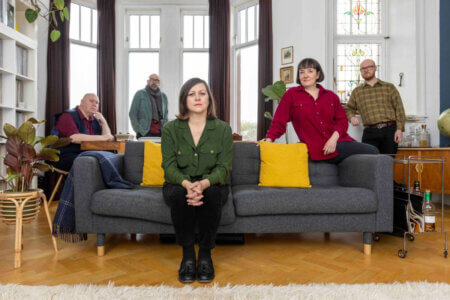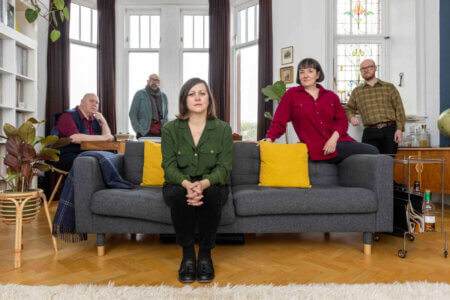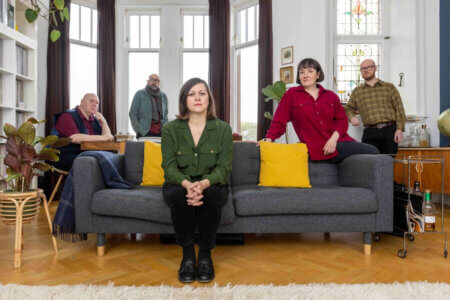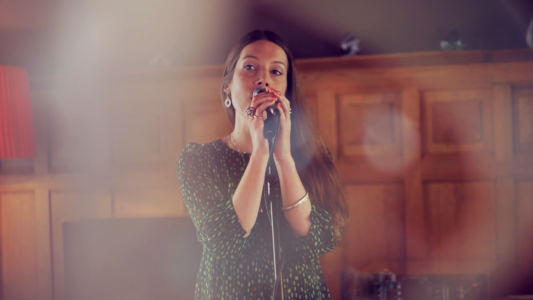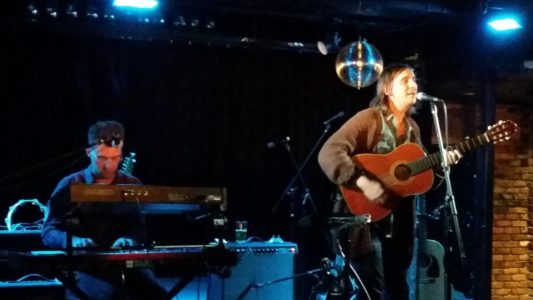Camera Obscura are seeing life through a new lens
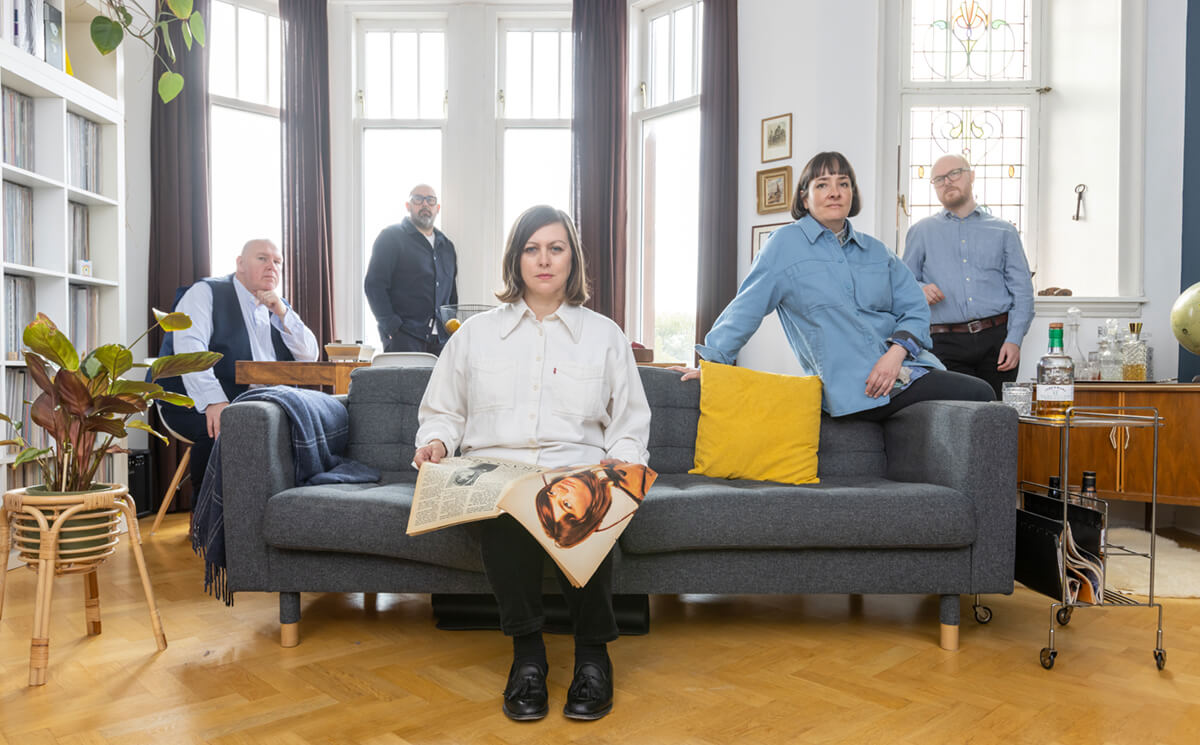
In the decade since the release of Camera Obscura’s fifth record Desire Lines, the Scottish band fronted by Tracyanne Campbell have experienced the death of their keyboardist Carey Landers, explored different musical projects and entered parenthood. To the delight of their fans, earlier this year, the band shared the news of their long-awaited and perhaps unexpected return with glimpses into their sixth studio album entitled Look to the East, Look to the West with singles “Big Love”, “We’re Going to Make it in A Man’s World” and “Liberty Print”. Each offering demonstrates foundational sonic strands that endeared them to fans whilst incorporating new elements that display their artistic and personal developments.
Camera Obscura’s vocalist and lyricist Traceyanne Campbell tells Northern Transmissions about coming through grief, writing songs again and how the band got their groove back following a restorative gig on a boat.
NT: I couldn’t believe that 11 years have passed since Desire Lines was released. During that period, the band took a bit of a break. I know you made an album with Danny Coughlan in 2018, aside from that, how did you find life away from Camera Obscura and not being in the same rhythm and routine of writing songs?
Tracyanne Campbell: It’s crazy to me that that’s the length of time that has passed because you fill that time up. Time is always filled up with something. I felt busy over the past 11 years, with a mixture of things. I became a mum and my kid is 10, he’ll be 11 in September. He was born pretty much nine months after Desire Lines was finished, practically. So, I was really busy coming to terms with all of that and the change of my lifestyle. I think the first five to six years of your kids’ life, well for me, anyway, it was the only thing I could think about. He was my priority. You don’t even have to think about it being a priority, it just becomes a priority. I think I pretty much just got really into that. Of course, Carey [Lander] was sick during that period and passed away when my son was three. When he was three, she was gone and then I was continuing to be a mum and living my life in Glasgow and trying to deal with the grief and the loss of my friend and process all of that.
I’m really bad with dates but maybe when my son was six or seven, I began thinking about making music again. Dan and I took quite a lot of time to make [Tracyanne & Danny] because we were in different cities and we didn’t really know each other, so we were getting to know each other. And, it took up a good four years, or something. I think when I first met Danny, his wife was pregnant with their son, who’s now 11. But, yeah, time gets filled up!
In a way, yes, there has been a hiatus technically for the band and there’s been a break, but life just goes on. You don’t get to take a break from your life, do you?
NT: No, unfortunately. It’s an interesting prism of grief and new motherhood to approach writing songs again. In that way, I thought that Look to the East, Look to the West is such a fitting title for the new record. It made me think of the actual action itself and typically when crossing a road, we look left and right to know that it’s safe to proceed. Did you feel a safety or comfort in yourself to start writing again and processing the different experiences you’d been through in the last decade?
TC: Yeah. I think for a long time I was a bit lost, to be honest. I was a mom and I had a husband and had a nice house and a nice life and all the rest of it, but I did have a sort of chat with myself about what’s my identity outside of all of this? I was really starting to come into my consciousness in a really powerful and big way. It was bothering me every day, I was like, ‘Right, this is all nice, but what are you going to do?’ For a long time I was struggling with that because I felt like I had grieved a bit for the band when Carey died because I felt that everything was lost. That sounds very dramatic, but I felt a bit like I don’t really know who I am anymore. I didn’t really know because Carey and I were very close friends, we weren’t just bandmates. We saw each other nearly every other day. She lived down the street and certainly when my kid was a baby and then a toddler, we’d meet every other day in a cafe or in the park or she’d come around the house and help me out or come around for dinner. That was really very difficult then when she was gone, to be sat wondering how to fill that void or who am I going to be now?
I really didn’t know. Could I still be that singer in that band? Or am I going to have to think of something else? I’ve never been good at thinking of something else to do because I’ve always put all my eggs in one basket and I didn’t know how to be anyone else, really. I think when I met Dan, something told me that I had to make a record with him. I was drawn to Dan’s voice, his character and we totally loved each other straight away and I had a new best pal. He really helped me gain my confidence again and I learned how to write songs again. Then, when Camera Obscura was asked to play the Boaty Weekender by Belle and Sebastian, we started rehearsing for it again. A lot of questions came over me again of ‘Could we do it again? Who would I be? Could I do this again? Is it alright to do it again? Can we do it without Carey, can we do it without her?’
Slowly, all of those things started making sense again and I was back sort of feeling in my comfort zone and I started writing very openly and freely without it being laborious or feeling like a task or a mountain to get over. It happened quite naturally. I think from that point, I started being a bit clearer in my mind about where I was going and what I wanted to do.
NT: How are you finding this aspect of the record coming out? Obviously, when you’re writing lyrics and in the studio with the band, they’re both very personal and intimate settings. Now, with the release date approaching, there’s the forward facing element where you’re talking about the work and the experiences that went into it and of making it. How has that been? Do you feel particularly protective of this record?
TC: I think I’m fairly good at being quite open with that, these days. You do invest so much in these songs and spill your guts over each page and then they become something else that you’re less close to, or something. It’s not like you feel it every time you’re on stage, you can’t really do that. You do that when you’re in the studio recording it and then you’re vulnerable letting the songs out there. I think by the time it’s gone to a record label and it’s put out, you’ve got a different relationship with the work. They don’t really feel like mine. I can’t really take that precious, ‘Oh, I don’t want to talk about it,’ stance because I feel like they’re not mine anymore, they’re yours or they’re other people’s now, it sounds so corny, but to share and to make your own.
So, I don’t really have a problem. I suppose if I was to sit down, before this interview for instance, and really intensely listen to the songs and then go, ‘What was I saying there?’ I don’t like doing that. I just really like thinking about what I thought at that time. Of course, doing all this again, it’s been a while since I’ve done the whole press thing. I think I’m just a bit more comfortable with it. I’m practically 50 years of age and I think being a mom, you sort of, you have to sort of grow a bit of a thicker skin. I’m not saying I’m not sensitive to things, I’m just less uptight and embarrassed. I’m just like, ‘Right, well, that’s the best I could do. That’s the best I can manage and if it’s not right, I’ll try and make it better’. You’re less apologetic or I, at least, feel less self-conscious.
NT: You mentioned the Boaty Weekender. The line-up for it was terrific; Mogwai, Yo La Tengo, Belle and Sebastian and Alvvays. What was that experience like? What were some of your favorite memories from that time? I’d say that was a lot of fun!
TC: It was. I have to say at first, I was quite apprehensive, for lots of reasons. I was apprehensive about being on a boat, I was apprehensive about being on a boat stuck with everybody on that boat and not getting on the tour bus at the end of the night. I was nervous about all that. I’m so cheesy when I talk about Boaty because it was such a beautiful experience. It was so loving and warm and I felt so in the right place at the right time. I felt part of a big gang, not just with the band but with the people that came to see us play. It made me really give myself a break in a way. I felt like if we’d met each other at college or in a bar, we’d all like each other and we’re all there for the same purpose. You know, we all like the same kinds of music and we’re all pals there. It really felt like that and not claustrophobic at all. It was very warm and the people were really respectful and it was just really good vibes. The Belles got the line-up so good. It was such a great line up for everybody to enjoy and I just had a wonderful experience.
It was great being back at work. And some of it was surreal, we played on the top deck and you’re literally sailing into the sunset. I did have to have a couple of pinch-me moments because it was so incredible.
Yeah, it was a really moving experience and it was inspirational as well. Out of that came songs like “Baby Huey (Hard Times)”, I wrote that on my way back. I feel like it sort of kickstarted all of this for me, it started the little fire in my belly to do some writing again. I’m very grateful for that experience.
NT: Another catalyst was Margaret Salmon’s film, Icarus (After Amelia) for which you and Donna wrote the song “We’re Gonna Make It in A Man’s World”. Was that your first time specifically writing for a film?
TC: Yeah, it was. I met Margaret through a friend, Kirstie McDonald, who’s the curator of Margaret’s exhibition and film. Margaret was looking for someone to write some music and at first I thought that I was out of my league here, you know, sitting with this academic, feminist filmmaker. I was like, ‘I don’t think it’s me you’re after’. But, I saw her film and she told me it was about and her film was going to be and her exhibition took place in a working class part of Glasgow, in an area where shipbuilding was prominent back in the day. It meant a lot to me to witness this film. It was about women’s work, what women do, what work do they get paid for? Margaret can obviously articulate it far better than I can, but I just got it. I was a bit intimidated at first because I didn’t really know how to do that, but I’d been in the middle of writing songs anyway. I’d all the lyrics and the melody for “We’re Gonna Make It in A Man’s World” and I thought that I could develop that idea because it’s talking to me a little bit. And then Donna and I basically did all the music. Margaret’s version was more of an instrumental version with some singing and then we just added to it and made it a full band version for the group. That was quite unusual actually, also writing with Donna, considering she’s just joined the band and I didn’t set off to do that. The song was, to my mind, too good to not develop it further.
NT: What was it like for you to develop that creative partnership with Donna? The band has been together for over 25 years. What was it like forging something new with someone in that capacity?
TC: When she started playing with the group, we just really clicked. There wasn’t a case of, ‘Oh, how are we going to all settle down into this and get used to a new person?’. We were really lucky, I think the right person was suggested to us by people who knew us and knew her. We really did just get on straight away, musically and personally.
Donna writes songs and has done her own stuff previously. She was in a job where she was basically facilitating a lot of songwriting for other people and she wanted to get back into doing her own stuff. I think, at that time, she had felt she was lacking a little bit of direction or confidence and even though she’s a more than capable musician and songwriter, sometimes it just takes a little bit of a boost and she’d asked me to mentor her. Initially, I was like, ‘What? I don’t know how to mentor anybody, what can I teach you,?’. But we started doing that and she shared songs with me, which in turn, inspired me to write songs. It worked like that, it was sort of like game-on. It wasn’t a competition, but there was certainly a good faith nature of wanting to try our best to impress each other with these songs.
So, it just happened quite naturally. I think also, you know, I don’t mind admitting that in the past, I’ve been very focused in the group and very precious about it and wanting to write the songs and feeling like I wanted to make, whether people agreed or not, I wanted to make decisions. If I want to do it like this, then I want to do it like this. That kind of thing. Which is boring for people after a while. I just feel it now, as a person, less controlling and a bit more laidback about my abilities and my shortcomings and what other people bring. I’ve loosened up a little bit and you can get a lot more out of it. For everybody, too. I just learned to do that and to be less precious. It didn’t bother me so much. If somebody’s going to write a song in the group, quality control is a must. But I’m more like, ‘Go for it!’. I don’t feel the need to be the only person doing that job. I think it’s a strength to learn to just chill out.
NT: That comes across really well across the album. I enjoyed how varied the moods and tonal palettes are throughout and within certain songs there are different movements. It felt like in the making of them, there must have been a great sense of fun and of enjoyment in the arrangements.
TC: There really was. I’ve said this before and I really don’t want it to come across the wrong way, but in a weird way, it was probably the most enjoyable record that we’ve made for years. It’s obviously bittersweet because it’s not with Carey, it’s without her. I think you have to just find a way to move forward and make the best of it and try to be as positive as you can. There was no way on Earth I was going to get back in a room, or we were going to get back in a room, and not enjoy it. The tensions that might have been there before, there was no room for them. If you want to do it, do it. If you don’t, then don’t do it. There’s no place for holding her arms up or putting people’s backs up. I’m not interested in that. I do it because it’s enjoyable. I think you can hear that. I think there’s a lot of artistic freedom. We had fun making it, we made it with Jari Haapalainen who allows and facilitates that mixture of hard work and challenge, but also fun. That’s what it is about. At the end of the day, you’re in a room and you can express yourself in whatever way you want. It’s a privilege. Sometimes we’ve been a bit uptight and I think we’re a bit better at going, ‘Ok, that hasn’t worked. Should we just try like this?’.
NT: The record nicely blends elements of previous records with interesting new tones. I thought it was interesting that you worked with Jari Haapalainen, who produced Let’s Get Out of This Country and My Maudlin Career. With that, as well, Fiona Morrison features on the artwork on the new record and fans will recognize her from the Camera Obscura debut. It feels full circle, however, the circle isn’t exactly complete. There’s still a gap for you to keep going.
TC: Yeah, I didn’t want it to feel like we were bookending it, in which you could interpret the artwork and working with Jari as sort of a grand finale, bookends type job but it wasn’t really like that. With Jari, it was more about how I really did feel quite vulnerable, even though I was enjoying writing new songs, you still question if they’re any good. I did really feel that he was the person to tell me the truth and to steer us in the right direction. He’s such a workaholic and also a very sincere person, very truthful and loyal and he’s always wanting to get the best out of everybody and the best of himself. He really is adamant and ambitious to do the best.
He’s always like, ‘It must be better than the records we’ve made before, it must be better!’. And, of course, I wanted my songwriting to be better, I wanted to be more ambitious. I didn’t want to make, you know, as proud as I am of Let’s Get Out of This Country and My Maudlin Career, I didn’t want to do them again,I wanted a new experience. The music’s moved on and we’ve all moved on, people become parents and he’s had to adapt his working style. You know, it’s not all going into a studio and playing live. We did and we are used to that and have done it. But he works with loads of different bands where they just send him tracks and they mix it and that’s the modern world now. So many young musicians that I know, they just do it all themselves. There’s different ways to do it, obviously, and I do feel like we’re quite old fashioned in the sense that we went to a studio, we paid money for the studio, got in there and that’s your chance to make the record in that week and whatever you capture that’s it! You’re not going back to change it. I love that.
NT: I really enjoyed hearing the pedal steel and drum machines being used in the arrangements. While you were making the record, were there any particular arrangements that when you heard them coming together got you really excited about the finished product?
TC: Tim Davidson plays pedal steel guitar on the record. He plays in some country bands and rock’n’roll bands, he does country-jazz and all that and he plays pedal steel with them. We’re separated now, but a lot of the time when I was writing songs at home, he would hear me, and join in. There was a vague idea to get pedal steel on something on the record. And then once Jari got him into the studio, he didn’t let him out until around 6am! I think the band wanted to use what we had. In the past, we’d done the big string arrangements and had guests. For logistic reasons actually, because it was just post-Covid and there were still a lot of lockdowns and shutdowns and cancellations and we didn’t want to rely on anybody else. Tim was there with his pedal steel and it worked out really well.
NT: I love watching pedal steel being played, it’s one of my favorite instruments. It just always sounds so wonderful. It can be one of the saddest sounding instruments but then also there’s a bit of mischief in it as well.
TC: Me, too. It’s wonderful. It’s a very playful instrument. I think a lot of people have sort of very clear, conservative ideas about it and, you know, just because you play pedal steel doesn’t make it country music. it can do so much more and it also can be used in the wrong places, a lot. Tim’s very passionate about pedal steel music and has all his favorite players and they do so much more than just old-fashioned country. It’s a great instrument when it’s in the right place.
NT: Have you watched videos of Peter Drake playing it?
TC: Yeah, that was a big influence on us. That song, “Forever”, we actually bought one of those voice things but it didn’t quite work out. But yeah, I love that song.
NT: We briefly spoke about lyrics earlier. With this record, I was struck by how self-confidence and self-worth are prominent themes. It really feels like Look to The East, Look to The West was very much informed by you reflecting on your identity. That’s something that never ends for people, I feel. We constantly go through change and inevitably become different versions of who we were. In this regard, were you ever surprised by some of the things you wrote for the record?
TC: I think I wrote in the way that I always do in that it’s a sort of cathartic process for me. It’s about the therapeutic feeling of it. If I’m working something out in my head, I’m the sort of person that’s got a constant battle going on in my head about everything. I never give myself a minute’s peace. I find if I just write it down, it helps me. It’s a cathartic thing. So, I didn’t struggle so much with the lyrics, I found the songs very easy to write because I was going through a lot. There was a lot going on. A lot of themes from the past 10 years of being a mum and figuring out what’s my job? What’s my identity? Is my marriage working? Where am I going to be? Who am I going to be? What am I going to do? You know,
I’m 50, am I still relevant to anybody? There were a lot of questions about lots of things and I tend to work that out on paper.
NT: Does it feel like it’s helping at that moment?
TC: It always helps. Definitely. It always helps. It gives you clarity, I think. It gives me some clarity. I always feel better about getting it out.
NT: With the song “Baby Huey (Hard Times)”, the first time I listened to it, from the drum machine and the synths, even though the vocal melody doesn’t sound like this song at all, it reminded me of the Thompson Twin song “Hold Me Now”.
TC: We actually did a version of that song that was like an 80s pop song, a sort of Alison Moyet style. We did do a version of that and that’s how it was initially, but, we changed that song a lot. My original demo was, all my demos are quite similar, but I sat at my kitchen table and I used my little iPad and I just played my guitar and they’re very acoustic-y, like it is on the record. But I didn’t really want it to be like that. I thought it sounded more like solo material. I wanted to figure out how we’re going to get the band in here. Jari is always very much about honoring the song and the pureness of the song and he likes very much a lot of my original demos and he’s very much like, ‘Let’s do it like that’. It’s interesting to hear you say that because we did do a version of that.
NT: Interesting! When I heard that song, like I said, I couldn’t shake the Thompson Twins from my head and I read the lyrics of their song and it was weird because there are certain moments in that song that felt very connected to this record. Particularly the line,“You say I’m a dreamer, we’re two of a kind / Both of us searching for some perfect world we know we’ll never find / So perhaps I should leave here / Yeah, yeah, and go far away / But you know that there’s nowhere that I’d rather be than with you here today.” I thought that sentiment translated nicely to your writing.
TC: Yeah, I wrote “Baby Huey (Hard Times)” literally on the plane on the way back from the Boaty Weekender. It was such an emotional experience. It was kind of a love song to the fans, I guess. It was a sort of love song to the people on the boat. I was just so swept-up in the whole feeling of all of that. It was like the love boat or something! Baby Huey’s music was playing on the boat as we were waiting in the foyer to get off the boat and that’s where the idea came from.
NT: ‘Sugar Almond’, which is a tribute to Carey Landers, is a very poignant moment on the record. The performance, too, has such rawness and intimacy to it, it’s like we’re in the room with you while you’re singing.
TC: I hope so. I hope you are in the room with me because that song was only recorded, I think we took two passes of it. It’s just me and Donna in the room and we’d not really practiced too much, I mean, she had to rehearse the piano, but we didn’t really practice it a lot together. Everybody else was in the control room. I had a bad throat when we were making the record, I’ve got a bad throat now, and I was really feeling disappointed by what my vocals were going to be like. I was feeling a bit under confident because I was thinking that my vocals were crap. I wanted to be singing really well and to my mind, my vocals weren’t great. I also didn’t want to sing a lot, you know, over and over and over again because I didn’t want to lose my voice.
We did that song late at night. We did that one and “Sleepwalking” late at night, maybe even back-to- back. I can’t exactly remember. We took a couple of passes and after we did the first one we were like, ‘Yeah, that’s good,’ and then we did a second take and I was like, ‘I don’t think I can sing this song any better or any worse. I think it’s what it is,we should just leave it at that’. So it was quite intimate.
I didn’t want to make a big drama about it and make it, like ‘Oh, here’s the big sad song’. But, it is a sad song. It’s a brutal song. When we were talking earlier about how was my confidence about my lyric writing, did I feel self-conscious? I did feel quite self-conscious about that song, actually, because I felt that maybe I should just keep it as a private demo. It’s a brutal song for people like, I thought about Carey’s mum. I didn’t want to be adding fuel to the fire of grief but it just came out of me and that’s it. I didn’t think long and hard about it, I wrote the song and, in its own way, it was easy to write. I think it would have been remiss to make a record and not…It would have been very strange to not have to write something as clear as that about Carey.
NT: It’s a beautiful tribute to your friendship and about missing your friend, as well. I think people who have experienced grief will appreciate that song.
TC: Yeah, I think grief is all sorts of things, isn’t it. There’s no end to grief. You don’t get to a point and go, ‘Well, that’s me all better now’. You just don’t and I think it’s good to accept that and to accept that you can still feel all sorts of things about the person and you can still think positively and negatively about them. The person was all sorts of things to you and none of that needs to go away. You just need to learn to live with that and everybody experiences grief. It’s such a big thing for people. I think it’s all right to talk about people who have died and to sort of keep them with you.
It’s interesting, when my kid was quite young, my mother-in-law was in the back of the car and my husband’s dad had died and he died, he died quite near the time Carey died and there was a lot of grief. There was a lot of dying and real difficult times, but you have to explain that to a three or four year old because he was very curious about it. I loved the way she talked about it to him and telling him that we remember people by talking about them. That’s how we deal with it. I’m simplifying it, I can’t remember the exact quote, but it was just really nice and I loved hearing that.
I think it’s important to talk about them. It’s probably something that wasn’t done back in the day, people died and you just got on with it and not talk about it. I don’t want to do that. I do want to talk about people who have died because they’re still important to me.
NT: In 2 years, Camera Obscura will mark its 30th anniversary. With this record and all of the live performances, tours, songs and records, how would you describe the ways that the band has shaped who you are as a person?
TC: I can’t separate myself from the band. I’m sort of like a dog with a bone. I can’t let it go and sometimes I wish I could bury the bone and not find it, but I just also need to find it all the time. I mean, I started trying to get a group together when I was like 20 years of age. That was my pursuit and I managed it. And, I’ve not managed to let it go!
Sometimes, I’m like ‘Why haven’t I become a gardener or something like that?’. Why didn’t that happen to me? Well, I kill all the houseplants. That’s probably one reason. I mean, what else could I do? I just can’t think of anything. Of course, the band is everything to me. It’s been my obsession, my passion, my love and my hate. It’s been all sorts of things. But, it’s amazing. We’ve done all the rounds and been all over the world. It is a privilege. I’ll have dark days sometimes thinking ‘What is this? Why am I doing this? I’m 50 sitting at the kitchen table, you know, humming a tune!’. Then other days, I think what a privilege, you know, that I can do this.
NT: And to be able to have a connection with people through songs is such a special thing.
TC: It is. It really is. That’s the thing, I don’t take it for granted. Maybe I did take it for granted or didn’t think about it but I’ve really come to think about it a lot recently and I think it’s really special. I’m very grateful.
NT: Finally, I had to clarify for myself. On “Pop Goes Pop”, do I hear you mention the band Sleepy Jackson?
TC: Yes! love Sleepy Jackson. I was looking back to the time when I was on tour and I was in the van and it’s the time when you had your CD Walkman and I had a few CDs and I must have picked up one of their records and I must have listened to that record about five times a day. I’m not joking. I was obsessed with that record. So, yeah, that was a little reference to them. All of The Sleepy Jackson albums are wonderful. I think I might have to revisit them while I’m making dinner tonight!
Pre-order Look to the East, Look to the West HERE
Latest Reviews
Tracks
Advertisement
Looking for something new to listen to?
Sign up to our all-new newsletter for top-notch reviews, news, videos and playlists.





